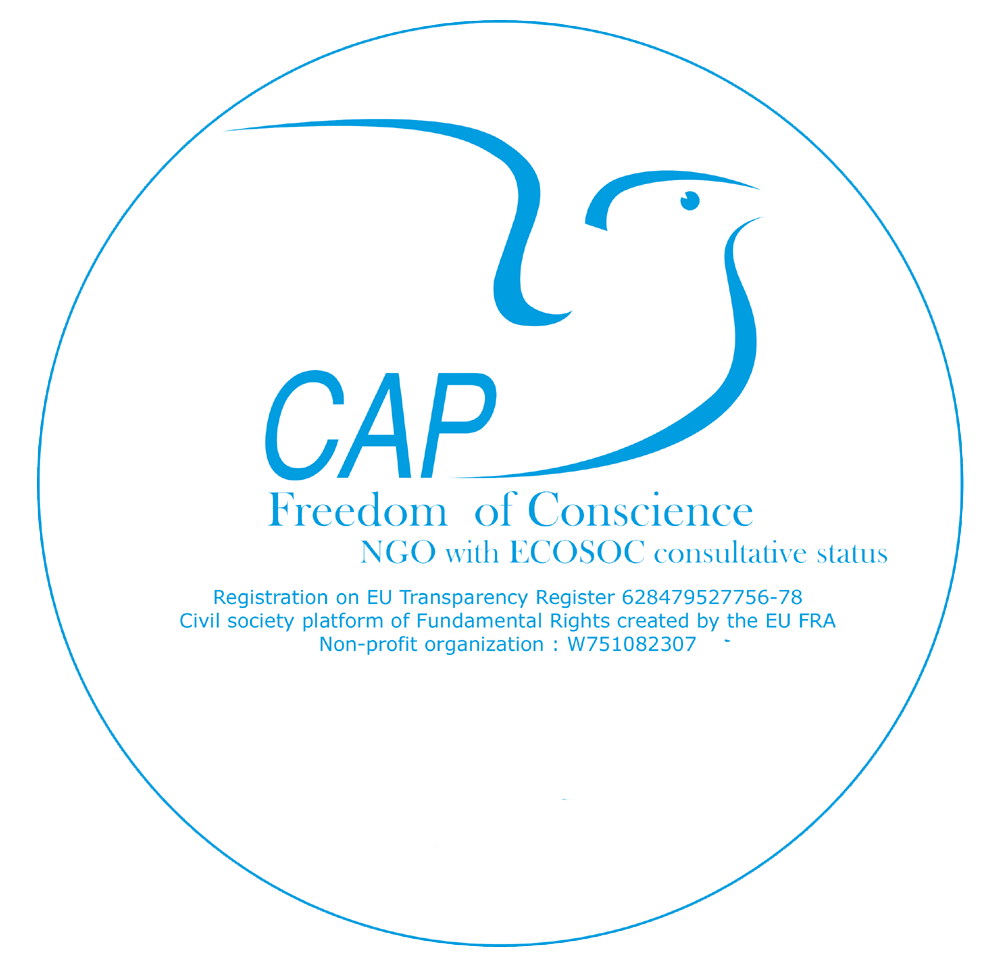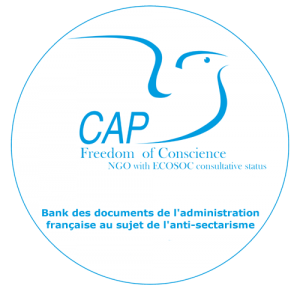By Thierry Valle
President CAP Liberté de Conscience
10/12/2024
Strengthening international solidarity to improve the Human Rights situation in the future
Why It Is Crucial to Promote the Idea of International Solidarity in Human Rights
It is a great pleasure to speak to you today, being the International Human Rights Day and the anniversary of the Universal Declaration of Human Rights. This significant document adopted back in 1948 provided a basis for the global recognition of the dignity and rights of every human being. However, when looking at the positive changes that have been made, one has to acknowledge that there are still many difficulties as to how these rights can be enforced in order to be applied to everyone.
This conference’s theme, “Strengthening International Solidarity to Improve the Human Rights Situation in the Future,” is quite actual and relevant. In today’s global setting, it is evident that human rights cannot be protected in vacuum. This calls for action, responsibility and solidarity of the nations, the civil society and the international organizations. Today I will try to explain how the institutions of the United Nations can help to build such solidarity and confront the present difficulties and create the future of a fair world.
The Part Played by the United Nations in the Protection of the Rights of the Citizens.
The United Nations has been a major player in the international relations since it was established as a global organization in 1945. Its main responsibilities are to keep and restore peace among the countries, to foster development and to defend the rights of people. In this framework, the UN has three major branches that I will call the “Three UNs”.
- The First UN: The Institution and Its Mechanisms The First UN: The Institution and Its Mechanisms
The first UN is the organization itself and its structures, employees and tools for its activities. This involves structures such as the Human Rights Council, the Office of the High Commissioner for Human Rights and treaty-specific monitoring committees. These mechanisms offer a forum for discussion, accountability and standard setting in the international law.
For instance, the UPR process enables the member states of the UN to report on each other’s achievements and failures in the sphere of human rights and make suggestions on how the latter can enhance them. Likewise, the work of country experts, special rapporteurs and other independent experts bring into the spotlight particular issues concerning freedom of religion, torture or rights of minorities. These mechanisms are crucial in ensuring that the issues of human rights are always at the forefront of the global agenda.
- The Second UN: The Member States.
The second UN consists of the member states that make up the organization. These states have got a dual status; they are the custodians of the UN institutions and are the main actors that are supposed to carry out the decisions of the organization. To sign and adhere to the mechanisms that regulate human rights, one has to agree to the International treaties and conventions. But this needs political commitment, measurability, and willingness to work through the multilateral system, which is not always easy given the national self-interests.
- The Third UN: This means the role of civil society and NGOs in the determination of human rights standards.
Due to their observer status, NGOs act as watchdogs, advocates and partners in the implementation of human rights standards. They provide important information to the UN organs, speak on behalf of the populations that have no voice and ensure states comply with their pledges. My organization, CAP Liberté de Conscience has ever participated in this process by preparing and submitting reports as well as declarations and holding conferences to expose specific human rights concerns.
Barriers to International Solidarity
However, there are numerous barriers that continue to hinder the development of international solidarity for human rights. These challenges include: These challenges include:
- Instrumentalization of Human Rights Mechanisms
Unfortunately, more often than less, we encounter the misuse of human rights instruments by states or other state and non-state actors for their own purposes. This situation thus undermines the credibility of these mechanisms and erodes the credibility of the system. For instance, some countries invoke human rights to interfere in other countries’ affairs, while at the same time, they fail to adhere to their own self-imposed standards.
- Lack of Resources and Accessibility
Most of the UN structures and particularly those dealing with human rights have a challenge of inadequate funding and accessibility. It is a challenge that Third World states and other disadvantaged states face the difficulty in accessing these mechanisms due to lack of funds and other resources. This leaves a gap in the representation and ensures that the system is not as inclusive as it should be.
- Global Crises and Competing Priorities
The world is going through a number of challenges including; armed conflicts, climate change and economic inequalities. These crises sometimes hijack the attention and or resources that would have been focused on human rights thus enabling the society to experience a lack of focus and cooperation.
Proposals to Strengthen International Solidarity
In order to address these challenges and enhance the international solidarity, some international expert propose the following actions: In order to address these challenges and enhance the international solidarity, I propose the following actions:
- Enhancing the Effectiveness of UN Mechanisms
o Increase funding and resources for human rights bodies, including the OHCHR and treaty-based committees, to ensure they can operate effectively and inclusively. o Develop more robust follow-up mechanisms to monitor the implementation of recommendations made during the UPR and by special rapporteurs. o Strengthen accountability and increase the visibility of the selection of experts and decision-making processes in order to gain the confidence of the society.
- Fostering Collaboration Between States and Civil Society
o Encourage states to work together with NGOs and other civil society organizations/agents, instead of against them. o. Provide forums for discussion and cooperation between states, NGOs and UN organs to address certain human rights concerns. o Capacity building for NGOs especially those from regions that are not well represented in the international system to enable them to access the processes.
- Promoting Education and Awareness
o Provide funds for programs that will raise awareness of human rights and solidarity within the society and across the world. o Create awareness campaigns in order to sensitize people on the need for international cooperation in fighting various challenges. o. Promoting the integration of human rights education in the academic curriculum to bring up the new human rights activists and leaders.
- Strengthening Regional and Global Partnerships
- Improve the coordination between the regional human rights mechanisms and the UN to have a more strategic and all-embracing approach. o. Press upon states to ratify and domesticate on international treaties for example the International Covenant on Civil and Political Rights (ICCPR) and the Convention on the Elimination of All Forms of Discrimination Against Women (CEDAW). o Cross regional initiatives that target on issues of common concern like migration, climate change and digital rights.
As we celebrate the Universal Declaration of Human Rights, we should remember the spirit of this document and work together to build a better future for everybody. Let me now propose that we strengthen this international solidarity, not as an empty slogan, but as a practical way of bringing a better world.
Thank you.







